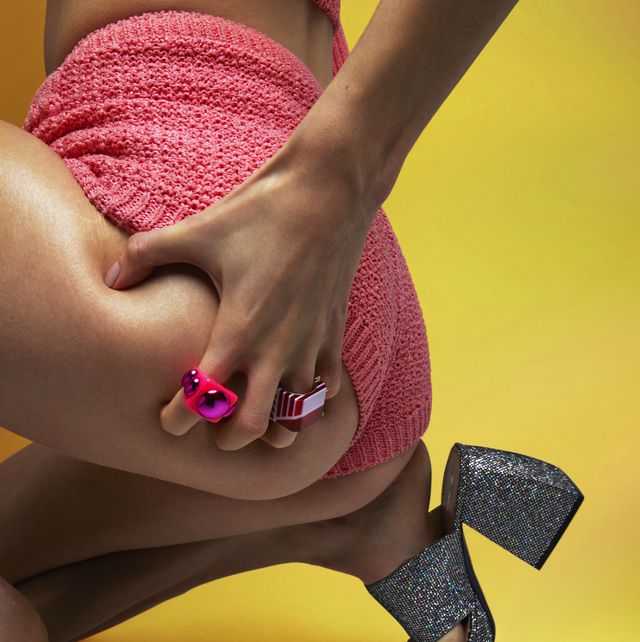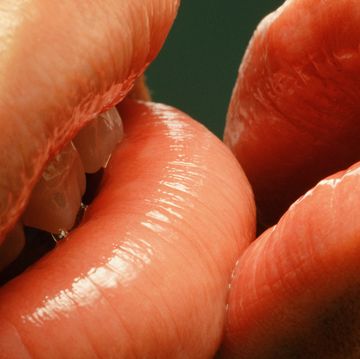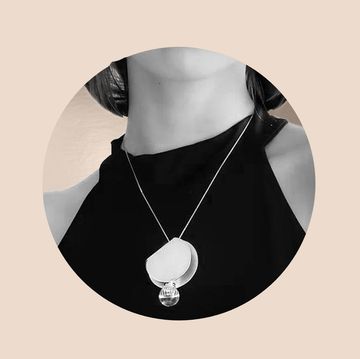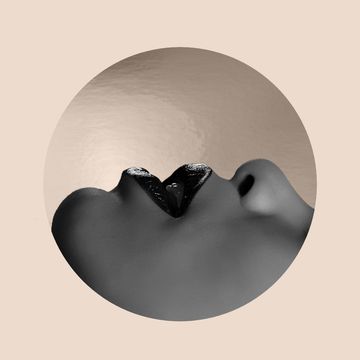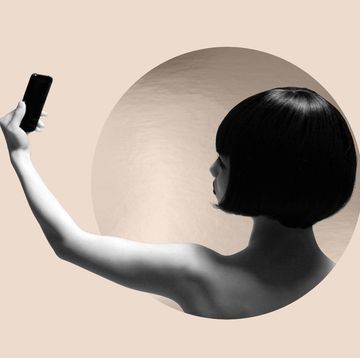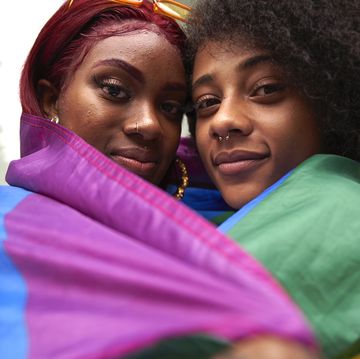It’s an age-old question – what do women want? If only the answer were straightforward. But there’s nothing clear-cut about women’s relationship with sexual pleasure. It can cause feelings of shame, insecurity or disconnection. And for some, it’s intrinsically linked to fear. But pleasure is an integral part of what it is to be human. Finding the power to access and seek out pleasure in the bedroom isn’t just about the pursuit of better or more regular orgasms. This confidence and power, once we embrace it, feeds into all aspects of our lives.
In 2022, decades on from the supposed sexual revolution of the Sixties and the sex-positive movements of the Nineties and early Noughties, we find ourselves at a contradictory point in time, where you are able to buy a vibrator in Boots with your lunchtime meal deal, but the concept of women experiencing sexual pleasure is not nearly as commonplace. In a study around what has become known as the ‘orgasm gap’, researchers found that during first-time heterosexual hook-ups, women climax 40% of the time, whereas men do in 80% of experiences. When examining longer-term sexual contact, the research showed that straight and gay men orgasm 85% of the time, women having sex with women climax 75% of the time, and women having sex with men experience an orgasm during 65% of encounters. Although we know that an orgasm isn’t the only way to gauge pleasure, these figures paint a stark picture. In an age of revenge porn, the fear of nudes going viral without consent, attacks on reproductive rights, sexist digital censorship and the very real threat of physical violence, is it any wonder that, for a lot of women, accessing sexual pleasure is significantly more complicated than ‘just letting go’?
This conundrum reveals itself in how we feel about our bodies, and often impacts our confidence to experiment and ask for what we most enjoy. It influences how our minds can disassociate during sex, how tense we can become in sexual encounters, the shame we may feel around our fantasies and desires, and how, for some women, we don’t know what we really crave because pleasure is associated with an experience that feels unsafe.
In Katherine Angel’s 2021 book, Tomorrow Sex Will Be Good Again, she examines how society and culture have had an impact on the sex lives of women in the western world. In the chapter ‘On Desire’, she discusses the work of sexologist Leonore Tiefer, who makes the point that, ‘sexuality is lived in context and that context is not always conducive to women’s enjoyment.’ In other words, if a woman’s pleasure depends on encountering forces that could be harmful, they are more likely to shut down or avoid it altogether. Later in the same chapter, Angel writes, ‘Shame, fear, cultural proscriptions and trauma – often sexual trauma – can be profound inhibitors to sexual enjoyment. Yet women are urged to claim their desire with confidence. No wonder many women have a complicated relationship to their desire; no wonder it may need careful eliciting and that they are easily inhibited.’
The source of this disconnect can be traced back to the well-established patriarchal practice of controlling a woman’s sexuality in an effort to ensure familial succession: men created shame around sex and female sexuality so they would be able to guarantee the children their wives carried were indeed theirs. You might question the relevance this fragile medieval male ego has today, but it’s very present – we still see and feel the ramifications of this behaviour and ideology in modern-day slut-shaming and the entitlement some men feel towards women’s bodies. It has given rise to incels and sexist and racist algorithms, and has had a long-lasting impact on how women ultimately feel about their right to experience pleasure.
Disconnection, shame and judgement are all issues that Erica Storm examines in her work with women and couples. As a confidence coach, trainee psychosexual therapist and yoga teacher, Storm wants to take the shame out of sex and pleasure. Her aim is to empower women to own their sexuality and prioritise enjoyment, because sex is normal. As she puts it, ‘We all deserve to feel free and liberated with our sexuality without shame, as long as it’s consensual.’
Across a range of one-to-one sessions and her ‘Power of the Pussy’ retreats, Storm educates women about their bodies, challenges sexual scripts and encourages self-acceptance through sensual yoga, orgasmic breath-work and body worship. ‘I’m a big believer that, in order for you to honour yourself, you have to love the body you’re in. It’s looking at your naked body in the mirror and being appreciative of what your body does for you,’ she says. Through her sensual yoga classes, she encourages women to really inhabit their bodies, to notice what feels good for them, to lean into the parts of their bodies that are responding and, most importantly, to breathe. ‘Once you learn how to breathe properly, your body will relax,’ she continues. ‘The breathing exercises are so liberating because you’re giving yourself permission to be free.’
Broadening the understanding of female pleasure is a core aim of OMGYES, a platform endorsed by the actor and activist Emma Watson. Its website offers advice informed by the first wide-scale research into women’s pleasure – which involved interviewing over 20,000 women aged 18 to 95 – and includes a glossary of techniques that are about more than just penetration. It features moves such as ‘hinting’ (65% of women said they enjoyed this method, which is touching everything around the vulva but not the vulva itself) and ‘layering’ (two out of three women said that touching the clitoris through surrounding skin sparks pleasure).
But it’s not always easy to discuss what it is we like or don’t like. Eleanor Tattersfield – who runs Sex Secrets, an online confessional platform where people submit anonymous sex secrets on postcards – sees this first-hand. She describes a recent submission from a woman who wrote about being in bed with a man who put her into a reverse-cowgirl position on their first date, which was uncomfortable and made her feel like a sex object, but she went along with it. This inability to express what we want in bed, to honour our desires, is something Tattersfield considers crucial to our relationship with pleasure. She says, ‘In the dance that is sex, there is so much we don’t talk about because we don’t feel empowered enough to say, “Actually, I don’t like that. Could we try it another way?” We worry it will spoil the moment and make it embarrassing, rather than enhancing the experience.’
This block around communication can come from a fear of rejection or being seen as boring or weird. One of the positives of our online existence is that, across the kink/fetish spectrum, you can find others who share your outlook. This is something Tattersfield has found with the Sex Secrets project. ‘The more people share, the less lonely and the more connected we all are,’ she says. ‘However unique you think you are, or [whatever] your problem or kink is, there’s always someone out there who will be into the same thing or will have experienced something similar. It’s edifying to know that you’re not alone, especially if it’s something that you think is problematic or shameful.’
Sex Secrets is a welcoming place online. It’s a space that encourages joy, connection and transformation – a genuinely heartening corner of the internet. However, social media has had a negative impact on our relationship with pleasure. From promoting a wildly narrow body ideal to censorship and shadow banning (reducing the visibility of some accounts), tech giants such as Meta and TikTok are having a real-world impact on our ideas about sex. Erica Storm has always used Instagram as a way to share her sex-education messages and to raise awareness around her workshops, but is increasingly finding it hard. ‘They keep shutting me down,’ she says. ‘All I’m trying to do is educate and empower people, but other sex educators and I have to use a filter on what we can and can’t show.’
But experiencing sexual satisfaction is a crucial part of being human; as adrienne maree brown writes in her book Pleasure Activism, ‘Pleasure is not one of the spoils of capitalism. It is what our bodies, our human systems, are structured for; it is the aliveness and awakening, the gratitude and humility, the joy and celebration of being miraculous.’
Our relationship to sexual happiness is multi-layered and personal, depend-ing on our identity and often influenced by the messages and cues we absorb from society. As a Black woman from a Caribbean background who is a former dominatrix, this is something Storm recognises but also pushes back on. ‘Our relationship with pleasure and sex is massively linked to our cultural and religious backgrounds. It goes back to the social norms that you were brought up with, or the sexual script [you’ve learnt], but I’m a firm believer in developing your own ideas and your own identity,’ she says.
While there may be studies and headlines declaring Generation Z aren’t having sex, there is the argument that younger generations are embracing a new kind of sex positivity and progression by challenging gender norms. This is something the photographer and director Stella Malfilatre can attest to. Growing up, constant comments and surveillance of her body made her feel self-conscious when it came to being intimate with others. ‘In sexual situations, I would worry, “Do I look fat? Does he think I am fat?” I couldn’t let go, and my own pleasure was sidelined,’ she says. Leaving Copenhagen – a city that Malfilatre felt was toxic in relation to beauty ideals – for a more open and accepting London was a turning point. The move coincided with Malfilatre coming out as queer, which then led to a nurturing and important long-term relationship with her trans-masc partner. ‘My relationship now is, mentally, a different thing compared to the cis and heteronormative game-playing I was used to,’ she says. ‘I instantly felt much better about myself, because the way my partner expressed their feelings about me was so different and honest. I felt much safer.’ Malfilatre’s new relationship with her partner and her body has led to a much more honest, enjoyable and mutually pleasurable sex life.
In a world that wants us to feel shame, owning your own pleasure may feel like a scary thing to do. It may make you uncomfortable and fear rejection, but it is a radical act. As Audre Lorde wrote in her Uses of the Erotic: The Erotic as Power, ‘For once, we begin to feel deeply all the aspects of our lives. We begin to demand from ourselves and from our life-pursuits that they feel in accordance with that joy, which we know ourselves to be capable of. Our erotic knowledge empowers us.’
Danielle Pender is the founder and editor of Riposte. Her book, Watching Women & Girls, published by 4th Estate, is out now
